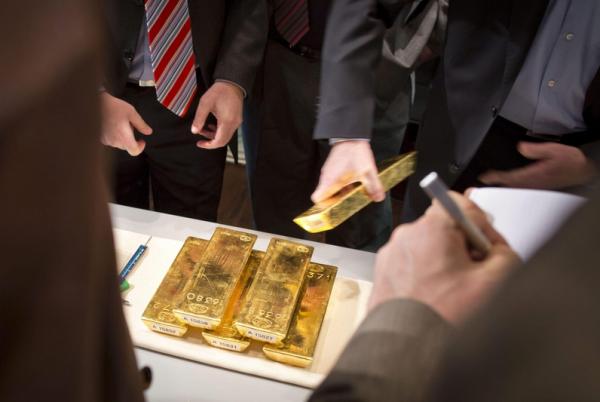Investing.com - Gold prices pushed higher on Friday, pulling away from the previous session’s four-week low as risk aversion escalated and the U.S. dollar fell amid heightened tensions on the Korean peninsula.
Gold futures for December delivery settled up 0.51% at $1,301.45 on the Comex division of the New York Mercantile Exchange.
The precious metal was boosted after North Korea said on Friday it could test a hydrogen bomb over the Pacific Ocean after U.S. President Donald Trump threatened to “totally destroy” the country if the U.S. was forced to defend itself or its allies.
The remarks added to concerns that the escalating rhetoric could lead to one side misinterpreting the other, with dangerous consequences. Many investors favor gold during times of geopolitical uncertainty.
Even with Friday’s gains, gold futures ended the week down 2.09% after the Federal Reserve’s policy statement on Wednesday indicated that it is still on track to raise interest rates in December.
Gold is highly sensitive to rising rates, which lift the opportunity cost of holding non-yielding assets such as bullion, while boosting the dollar, in which it is priced.
Elsewhere in precious metals trading, silver was at $17.05 a troy ounce late Friday, while platinum settled at $933.45 with both metals posting a second weekly decline. Palladium added on 0.77% to $918.55 a troy ounce but still posted a third straight weekly decline.
Among base metals, copper ended at $2.95 a pound despite concerns about a slowdown in demand from China.
Rating agency Standard & Poor’s downgraded China on Thursday, saying that “a prolonged period of strong credit growth has increased China’s economic and financial risks.”
In the week ahead, market players will turn their attention to fresh comments from Federal Reserve Chair Janet Yellen as expectations start to grow for a December rate hike.
Investors will be focusing on a pair of speeches from ECB President Mario Draghi as well as remarks from the heads of central banks in the UK, Canada and Japan.
Ahead of the coming week, Investing.com has compiled a list of these and other significant events likely to affect the markets.
Monday, September 25
Bank of Japan Governor Haruhiko Kuroda is to speak at an event in Osaka.
The Ifo Institute is to report on German business climate.
New York Fed President William Dudley and Chicago President Charles Evans are both due to speak.
ECB President Mario Draghi is to testify about the economy in the European Parliament in Brussels.
Tuesday, September 26
Minneapolis Fed chief Neel Kashkari and Fed Governor Lael Brainard are both to speak.
New Zealand is to release data on business confidence.
The U.S. is to produce reports on consumer confidence and new home sales.
Later in the day, Fed Chair Janet Yellen is due to deliver a speech in Cleveland.
Wednesday, September 27
The U.S. is to release reports on durable goods orders and pending home sales. Later in the day Fed Governor Lael Brainard is to speak.
Bank of Canada Governor Stephen Poloz is to deliver a speech in Newfoundland.
Thursday, September 28
The Reserve Bank of New Zealand is to announce its benchmark interest rate and publish a rate statement which outlines economic conditions and the factors affecting the monetary policy decision.
Germany is to release preliminary inflation figures.
BoJ Governor Haruhiko Kuroda is to speak at an event in Tokyo.
Bank of England Governor Mark Carney is due to deliver remarks in London. Fed Vice Chair Stanley Fischer is also to speak at the same event.
The U.S. is to release final figures for second quarter growth as well as data on jobless claims.
Friday, September 29
China is to publish its Caixin manufacturing PMI.
Germany is to report on retail sales.
The UK is to publish figures on the current account and a final estimate of second quarter growth.
The euro zone is to publish flash inflation figures for September.
Canada is to report on economic growth for July.
The U.S. is to release reports on personal income and spending, which include the personal consumption expenditures inflation data, the Fed's preferred metric for inflation as well as data on manufacturing activity in the Chicago region.
ECB chief Mario Draghi is scheduled to speak in London.
